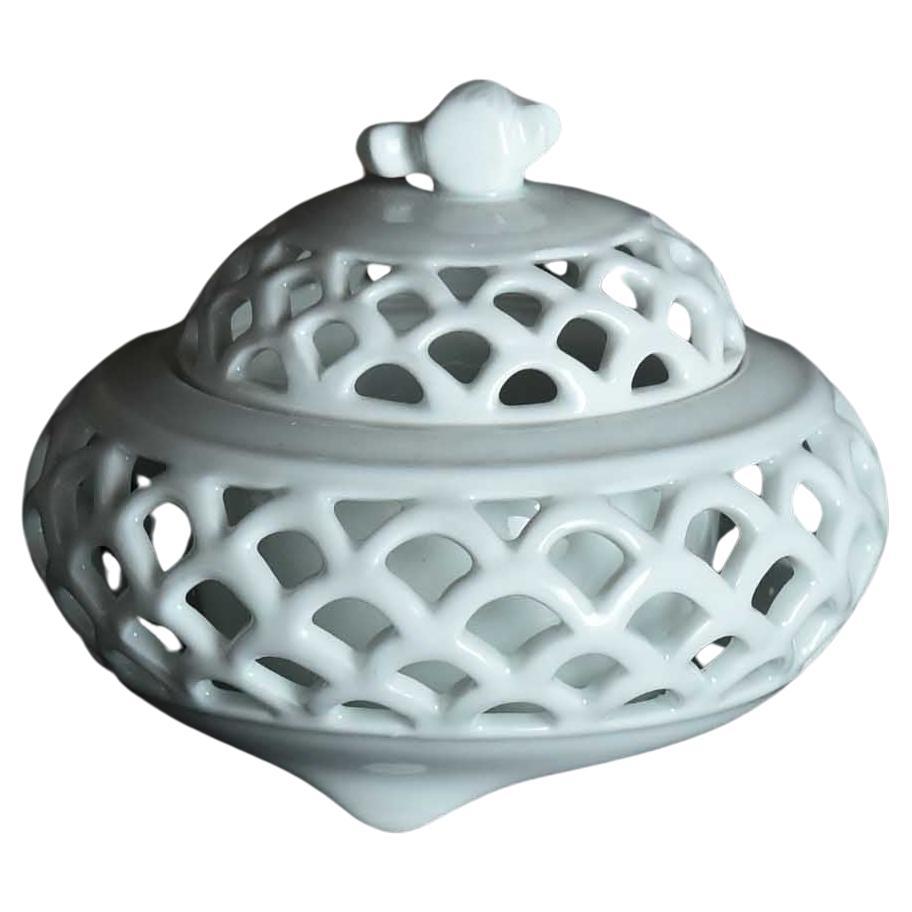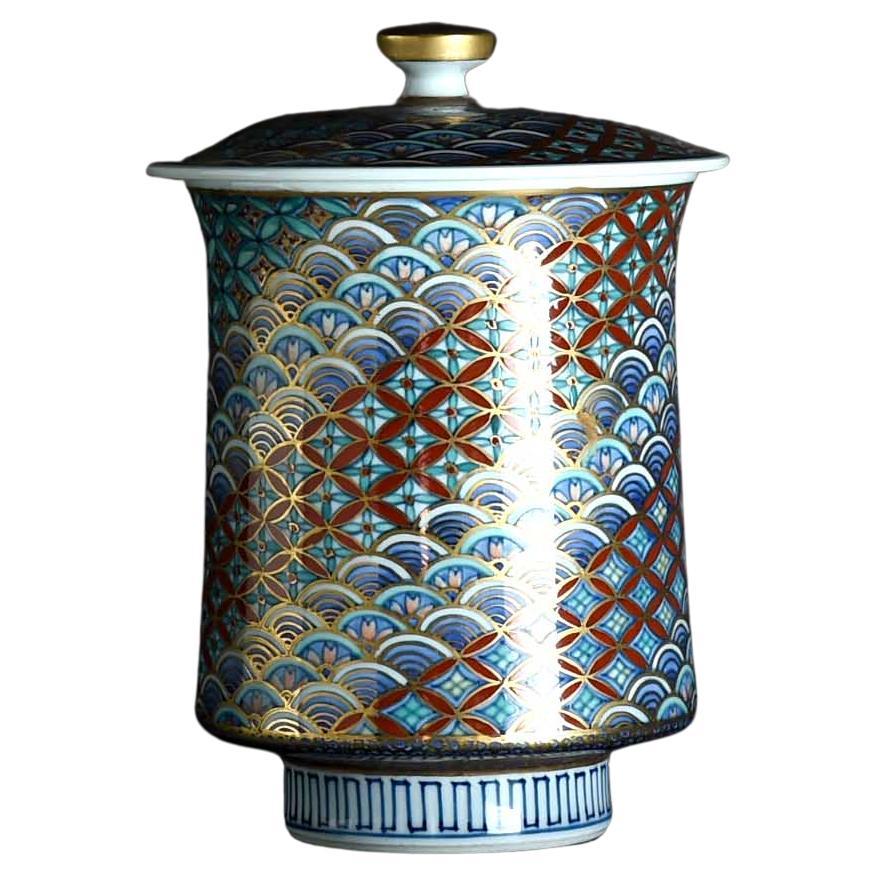Items Similar to Japanese Imari "Somenishiki Tsubakitakedutsu" Handmade incence holder
Want more images or videos?
Request additional images or videos from the seller
1 of 6
Japanese Imari "Somenishiki Tsubakitakedutsu" Handmade incence holder
About the Item
Hand-carved. A kouro is a vessel used for burning incense. The culture of fragrances was born in India and nurtured in China. In Japan, during the Muromachi period, the traditional culture of "koudou" or the way of incense appreciation emerged. It helps to enrich emotions and contribute to spiritual purification. It is highly valued as a decoration or gift.
- Similar to:Arita (Artist)
- Dimensions:Height: 4.14 in (10.5 cm)Diameter: 3.55 in (9 cm)
- Style:Japonisme (In the Style Of)
- Materials and Techniques:
- Place of Origin:
- Period:
- Date of Manufacture:1950-1960s
- Condition:
- Seller Location:Shibuya City, JP
- Reference Number:1stDibs: LU9752239841612
About the Seller
New to 1stDibs
Joined in the past six months.
No Reviews Yet
Vetted Seller
These experienced sellers undergo a comprehensive evaluation by our team of in-house experts.
1stDibs seller since 2024
- ShippingRetrieving quote...Ships From: Shibuya City, Japan
- Return PolicyA return for this item may be initiated within 14 days of delivery.
More From This SellerView All
- Japanese Imari "Somenishiki Sazankai" Handmade incence holderBy Imari PorcelainLocated in Shibuya City, JPHand-carved. A kouro is a vessel used for burning incense. The culture of fragrances was born in India and nurtured in China. In Japan, during the Muromachi period, the traditional c...Category
Mid-20th Century Japanese Japonisme Ceramics
MaterialsCeramic, Porcelain
- Japanese Imari "Somenishiki tsubakimaru" incence holder made in JapanBy Imari PorcelainLocated in Shibuya City, JPHand-carved. A kouro is a vessel used for burning incense. The culture of fragrances was born in India and nurtured in China. In Japan, during the Muromachi period, the traditional c...Category
Mid-20th Century Japanese Japonisme Ceramics
MaterialsCeramic, Porcelain
- Japanese Imari "Sukash"i incence holderBy AritaLocated in Shibuya City, JPHand-carved. A kouro is a vessel used for burning incense. The culture of fragrances was born in India and nurtured in China. In Japan, during the Muromachi period, the traditional c...Category
Mid-20th Century Japanese Japonisme Ceramics
MaterialsCeramic, Porcelain
- Japanese Arita "Madowari Shoukamon" Handmade incence holderBy AritaLocated in Shibuya City, JPHand-carved. A kouro is a vessel used for burning incense. The culture of fragrances was born in India and nurtured in China. In Japan, during the Muromachi period, the traditional c...Category
Mid-20th Century Japanese Japonisme Ceramics
MaterialsCeramic, Porcelain
- Japanese Arita "Somenishiki Madorikachou" incence holderBy AritaLocated in Shibuya City, JPThis is a hand-painted piece featuring a flower and bird design within a frame, which is called "mantori" in Japanese. The term "mantori" literally means "inside the frame," referrin...Category
Mid-20th Century Japanese Japonisme Porcelain
MaterialsCeramic, Porcelain
- Japanese Arita "Somenishiki Seikaiha" Handmade green tea cup with lidBy AritaLocated in Shibuya City, JPHand-painted. Seikaiha is a pattern of waves and scales that symbolizes "an endless, peaceful future" and is one of the auspicious motifs in Japanese culture. Sometsuke or "blue and ...Category
Mid-20th Century Japanese Japonisme Ceramics
MaterialsCeramic, Porcelain
You May Also Like
- Pair of Antique Japanese Imari Blue White Chargers with Geishas at Lake SideBy Arita, Imari PorcelainLocated in Miami, FLBeautiful pair of Meiji Period blue and white Japanese Imari Chargers depicting two Japanese Courtesans reading poetry by a lake in a serene setting framed by banana palms or trees o...Category
Antique 1890s Japanese Japonisme Ceramics
MaterialsPorcelain
- Imari sake ewer, Arita, Japan, c. 1700, Edo Period.By AritaLocated in Gargrave, North YorkshireImari sake ewer and cover, Arita, Japan, c. 1700, Edo Period. The globular ewer, with an unusual continuous band of circular moulded bosses, and vibrantly p...Category
Antique 1690s Japanese Edo Ceramics
MaterialsPorcelain
- Imari porcelain vase, Arita, Japan, c. 1700, Genroku Period.By AritaLocated in Gargrave, North YorkshireJapanese Imari porcelain trumpet vase, Arita, c. 1700, Genroku Period. The tall octagonal vase, well painted with a crane flying before a ...Category
Antique Early 1700s Japanese Edo Ceramics
MaterialsPorcelain
- Imari Black Ship bowl, Japan, c. 1890, Meiji Period.By AritaLocated in Gargrave, North YorkshireJapanese porcelain ‘Black Ship’ shallow bowl, 19th Century, Meiji Period. The bowl, well painted to the centre, with a circular panel, containing a Dutch merchant ship, firing a cano...Category
Antique 1890s Japanese Meiji Ceramics
MaterialsPorcelain
- Huge 17th century Japanese Arita Imari ChargerBy AritaLocated in Christchurch, GBAs part of our Japanese works of art collection we are delighted to offer this outstanding condition Edo Period 1612-1868, circa 17oo , very large Imari palette dish or charger, manu...Category
Antique 18th Century Japanese Edo Ceramics
MaterialsCeramic
- Japanese ormolu mounted Imari bowl & cover, c.1700. Edo Period.By AritaLocated in Gargrave, North YorkshireA large Japanese Imari bowl and cover, c. 1700, Arita, Edo Period, with 19th Century French ormolu mounts. The deep sided bowl, hand painted with alternating panels of flowering plan...Category
Antique Early 1700s Japanese Edo Ceramics
MaterialsPorcelain
Recently Viewed
View AllMore Ways To Browse
Vintage Incense Holder
Asian Incense Vessels
Arita Imari
Vintage Imari
Vintage Imari Porcelain
Midcentury Imari
20th Century Imari Japanese
Muromachi Period
Famille Rose Export
18th C Chinese Furniture
Famille Rose 19th Century
Antique Chinese Export Dragon
19th Century Large Japanese Porcelain
Famille Rose Export Porcelain
Japanese Porcelain Edo
China Foo Dog
Chinese Foo Dog
19th Century Chinese Famille Rose





